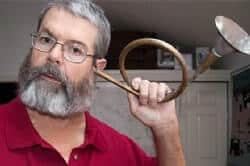Untreated Hearing Loss: Effects and Who to See

By Dr. Debra Griffin
This is the second article in a three-part series on hearing loss. If you have not yet read the first article, “10 Surprising Causes of Hearing Loss,” you can start there by clicking here.
Think about the people you have met who have an obvious hearing loss. Do they seem to be delayed and even disoriented during conversations? Do they repeat things or start conversations on topics that have already been discussed? Do they have the appearance of being uninterested in what is being said? Do they talk incessantly and never give others a chance to speak?
The effects of untreated hearing loss are devastating. Even with just a 10 decibel (dB) hearing loss — very minor — the auditory processing portion of our brain begins to waste away. Here are the statistical truths about the effects of hearing loss.
Effects of Untreated Hearing Loss on a Person’s Life
Tinnitus and hearing loss:
- Tinnitus is the perception of sound when no actual external noise is present, commonly referred to as “ringing in the ears.”
- Ninety percent of people with tinnitus also have hearing loss.
- The most common causes of tinnitus are noise exposure, aging, head injury and medication side effects.
- Tinnitus affects up to 50 million Americans.
Falling and hearing loss:
- People with mild hearing loss (25–40 dB) are three times more likely to have a history of falling. Every additional 10 decibels of hearing loss increases the chances of falling by 1.4 times the original risk.
Dementia and hearing loss:
- Seniors with untreated hearing loss are significantly more likely to develop dementia over time than those who retain their hearing.
- Adults with mild hearing loss are two times more likely to develop dementia.
- Adults with moderate hearing loss (40–70 dB) are three times more likely to develop dementia.
- Adults with severe hearing loss (70–95 dB) are five times more likely to develop dementia.
Memory and hearing loss:
- Adults with untreated hearing loss are more likely to develop problems thinking and remembering than adults with normal hearing. Degraded hearing may force the brain to devote too much of its energy to processing sound.
- Adults with untreated hearing loss develop a significant impairment in their cognitive abilities, 3.2 years sooner than those with normal hearing.
- Those with untreated hearing loss experience a 30–40 percent greater decline in thinking abilities compared to their counterparts without hearing loss.
Mental health and hearing loss:
- Hearing loss results in social isolation. Adults with untreated hearing loss tend to withdraw from engaging with family and friends.
- Adults 50 and older with untreated hearing loss are more likely to report depression, anxiety, anger and frustration, emotional instability, and paranoia, and are less likely to participate in social activities than those who wear hearing aids.
- The degree of depression and other emotional or mental health issues also increases with the severity of hearing loss.
Income and hearing loss:
- There is a $14,100 income difference between adults with mild and severe hearing loss.
- People with untreated hearing loss lose up to $30,000 annually.
- Hearing aids alleviate the impact of income loss by 90–100 percent for those with mild hearing loss and 65–77 percent for those with severe to moderate hearing loss.
- Adults with hearing loss who wear hearing aids have lower unemployment rates than their peers with hearing loss who do not wear hearing aids.
If you know someone or have a loved one that comes to mind as you read this, what should you do? Encourage them to get their hearing checked!
A study published in the Journal of the American Geriatrics Society found no difference in the rate of cognitive decline between people with no reported hearing loss and people with hearing loss using hearing aids. By contrast, cognitive decline is significantly accelerated for people who have hearing loss and do not use hearing aids. This is a wakeup call that it is time to address the hearing loss sooner rather than later.
Where do you start? Finding a hearing healthcare provider that has the training, knowledge, skills and aptitude is key. There are several types of professionals that can legally diagnose and treat hearing loss.
Audiologists: An audiologist is a highly trained healthcare professional specializing in the prevention, assessment and treatment of audiologic disorders. Audiologists are the only health care professionals who are university-educated and licensed to specifically identify, evaluate, diagnose and treat hearing and balance disorders, and to identify medically-related conditions that require a referral to a medical doctor. Today, a doctor of audiology (AuD) is required to become a clinical audiologist and is licensed in all 50 states.
Hearing aid specialist: A hearing aid specialist must perform a training program for a minimum of six months and 480 hours under the direct supervision of a sponsor. The sponsor must have practiced for two years consecutively and be board certified by the National Board of Certification in Hearing Instrument Sciences unless the sponsor is an audiologist.
As a doctor of audiology with 29 years of experience, my recommendation is to do your research. Ask other medical professionals who they would recommend in your area. Ask people who are wearing hearing aids what type of experience they have had. Be careful with Google searches as you will see many ads that are designed to bait and switch services and attract you with low prices. Read the Google ratings to see what people are saying about the practice. Stop in the office and meet the professionals and check out the office. My belief is that you will know when you find the right professional for you.
My hope and desire is that you have learned something new by reading this and that you will make an appointment for a wellness hearing checkup. What better time than the present?
This is the second article in a three-part series on hearing loss. Click here to read the third article.
About the author: Dr. Debra Griffin was born and raised in Lake City, Florida. She received her bachelor’s and master’s degrees at Florida State University and her doctorate at the University of Florida. She began her career at Shands Hospital in Gainesville, then moved to Jacksonville (both in Florida), where she worked with an ENT practice. She later managed the first Walmart hearing center in Jacksonville, which led to her opportunity to pursue private practice. In June of 1998, Dr. Griffin returned to her roots in Lake City and founded Hearing Solutions, Inc. Dr. Griffin also has an office in Live Oak, Florida, and sees patients at Copeland Medical Center in Dowling Park every Tuesday.



